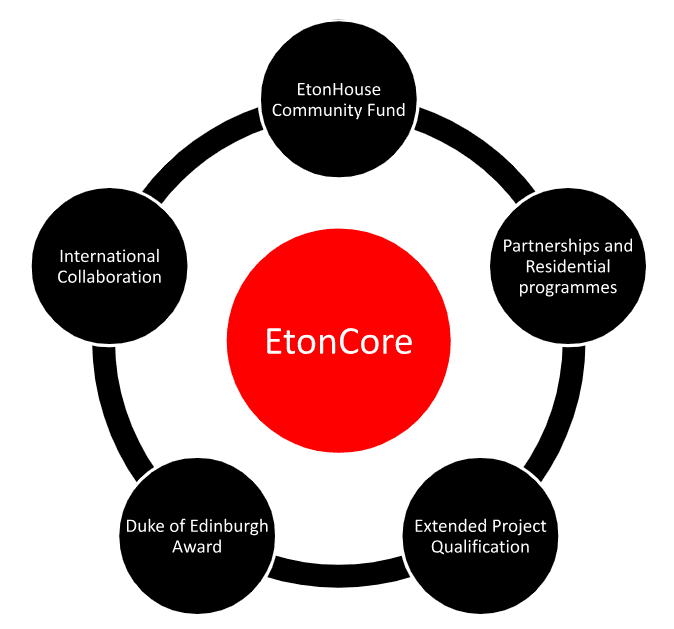Our EtonHouse High School One & Two programme culminates in the International A-Levels (IAL), offered by Cambridge and Pearson Edexcel, a globally recognised qualification that prepares students for university and beyond. The High School (Sixth Form) Programme at EtonHouse International School Orchard is designed to help students meet the increased expectations of universities and employers. Besides achieving strong academic results, students are expected to develop as confident young adults who can take responsibility, be accountable, and have the ability to set and meet personal targets.
International A-Levels are qualifications offered to students aged 16 to 18 at international schools globally. They are equivalent to British A-Levels and are highly respected by universities and employers, providing a direct path to university study. In 2024, over 400,000 students took the Cambridge A-Levels, compared to 140,000 pursuing the IB Diploma, highlighting its widespread popularity and strong reputation.
Universities do not have a preferred qualification between the A-Levels and the IB Diploma. What matters most is the grades that students achieve and overall achievements, and International A-Levels offer a unique advantage for success.
How International A-Levels Offer a Unique Advantage for Success:
- Tailor Subject Choices to Individual Strengths: Unlike the IB Diploma, which requires students to study 6 subjects across different subject groups, IAL only requires students to choose 3 or 4 subjects to specialise in and study in depth over two years. Students can focus on the subjects that they are strong in or interest them and that are required for their intended university degree. Most university entry requirements specify only three grades at A-Level.
- Modular Approach: The International A-Level programme follows a modular approach, where students take AS exams at the end of Year 12, and A2 exams at the end of Year 13, which test the content covered in the second year. The AS-Level grade, worth half the equivalent A-Level grade, provides universities with a valuable early indicator of academic strength and potential before the final A-Level results are available. After completing their AS exams, students decide which 3 subjects to continue into Year 13. The final A-Level grade is an average of the AS and A2 exam results.

- Flexibility in Retaking Exams: With two examination periods each year, students can take exams in May/June and have the option to retake A2 modules in October/November if necessary, ensuring they can achieve their best possible result to secure their place at university.
- More Time for Broader Interests: With fewer subjects, students have more time for self-directed learning and the opportunity to explore other interests through our unique EtonCore programme, Lifeskills course, and Physical Education programme. These initiatives are designed to enrich students’ Sixth Form experience, encouraging them to become active, compassionate, and lifelong learners. Additionally, they help students build a comprehensive and meaningful CV, which can enhance university applications and future career opportunities.
Through the Personalised Pathway Plan@16, each Sixth Form student works closely with staff to craft a personalised academic journey that balances academic goals with personal growth. The Personalised Pathway Plan@16 is an individual action plan, developed through discussions in Year 11, to identify the most appropriate A-Level courses to maximise academic potential while supporting personal development. These discussions also cover career aspirations, helping students make informed subject choices.
Subject Choices Offered:
- Art & Design
- Biology
- Business
- Chemistry
- Chinese
- Computer Science
- English Literature
- Further Maths
- Geography
- History
- Mathematics
- Media
- Physics
Choosing the Right Post-16 Qualification: What’s the Difference?
International A-Levels vs. the IB Diploma
The IB Diploma requires students to study six subjects across disciplines, including areas they may be less confident in. It also includes three core components—Extended Essay (EE), Theory of Knowledge (TOK), and Creativity, Activity, Service (CAS)—which can impact the final IB score. (Note: While CAS is not graded, failing to complete it means the student will not be awarded the diploma.)
In contrast, International A-Levels allow students to specialise in three or four subjects aligned to their strengths and university goals. This focused, flexible structure often leads to stronger academic performance and reduced pressure.
Both qualifications are well-respected by universities worldwide; the best fit depends on each student’s individual learning preferences and aspirations.
International A-Levels vs. British A-Levels
Both qualifications are academically rigorous and widely accepted by top universities. British A-Levels are typically offered in UK schools, with content often anchored in the UK context. In contrast, International A-Levels (IAL), like those offered at EtonHouse Orchard, are designed for global learners. Whilst the content of these courses is similar, the context in which they are placed is non-country specific and therefore more suited to an international context, making them especially appropriate for students in international schools or those planning to study abroad.







